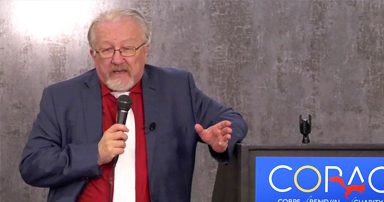All three of my key Priests who guided me are Priests of Opus Dei. Such Priests, since its inception, have taken great pride in their fidelity to the Magisterium and their loyalty to the Holy Father. In the late 90’s and just after the turn of the millennium, I told my Priests that it was easy to be obedient to Pope John Paul, but they should begin to prepare for how they would deal with a Pope it was NOT easy to be obedient to. If God was going to sift all, there could very well come a time when an honorable Priest had to carefully balance his lawful duty of obedience to authority over him and his duty of fidelity to the Magisterial teaching of the Church. It would not be sufficient to adopt one duty and abandon the other. To please God, one would have to strive mightily to balance both.
There is no doubt that the greatest enemies of the faith inside the Church are those dissident and heretical clerics and authorities who seek to overturn the Magisterium and remake it in their own image. I am shaken, though, by how many orthodox prelates and voices are frantically, if unthinkingly, doing their own damage to the faith. Some people who I have deeply admired have become more and more unhinged and over-aggressive, becoming less reformers and more aspiring destroyers. It has been a startling grief for me.
Right now, more than a few orthodox Catholic Priests in this country are being summarily dismissed from their Parishes – for being orthodox. It is neither wrong nor improper that they should push back, but how they do so is critical. Fr. James Altman (who has been formally removed from his Parish by his Bishop) has become the poster boy for these Priests – and there is no subject upon which he is not willing to opine, often in aggressive and caustic terms. He had a legitimate gripe, but if I were advising him (which I am not. Though we have mutual friends, I do not know the man), I would counsel him to dial it back substantially, maybe take a sabbatical and let someone else take lead for a few months. I have had about a dozen very orthodox folks, some of high rank, most simply in the pews, talk to me about how, though they enthusiastically support extensive reform, they cannot abide the constant caustic manner in which Fr. Altman mounts the offensive. When you have been wronged and conduct yourself in a manner which causes people to wonder who is the aggressor and who the wronged party, you have lost the narrative – and are on your way to losing the battle.
When I was in politics full time, we often had junior staffers and hyper-partisan allies who always wanted to go “big and bold,” unaware that the specifics of what they wanted to do were almost invariably nasty and offensive rather than big and bold – and would hasten our defeat by alienating people who wanted to be our allies. Yes, there is an emotional catharsis that comes from being hyper-aggressive, sarcastic and caustic to people who have wronged you, but the price of that catharsis is to generally squander potential victory. I have never been big on emotionally satisfying and undisciplined rants. I prefer victory. You must maintain the discipline to be ever bold and never brash. If someone tells me that they are going to “show” our opponents, if I am not in position to muzzle that person, I quietly distance myself. I want the chance of victory – and that never requires that a really futile and stupid gesture be done on somebody’s part.
It seems to me that every virtue has an evil twin that mimics it – and undermines the very virtue it purports to mirror. The evil twin usually insists that any who dispute it are going to hell. Here are a few:
- Virtue: The traditional Latin Mass is a beautiful and timeless expression of worship.
Evil Twin: The traditional Latin Mass is the only valid form of worship.
- Virtue: There are some serious and extensive reforms needed in the Hierarchy of the Church.
Evil Twin: There has been no valid Pope since 1958.
- Virtue: Dissident and heretical clerics often pervert the meaning of Vatican II.
Evil Twin: Vatican II, itself, was a betrayal of the Church and the faithful.
The animating substance of true piety is that God is in charge and is close at hand to us; that our duty is to do the little we can that is right before us with refinement, vigor and fortitude, trusting that the God of the gaps will cover what we lack. We are sent to call back all those who are lost to the Kingdom of the Master while fighting those who actually wage malicious war against the faithful. We are never to lump the merely timid and uncertain in with those who are actually malicious. Barring a road to Damascus event, which is entirely in God’s hands, the actually malicious will never be our allies. But we are called to comport ourselves so as to call the timid and uncertain into bold alliance with God. We will be called to account by God if we fail to even try.
The true enemies of the faith wage war on the Church, believing it to be a mere human construction, a construction they want to remake in their own image while retaining all its influence and power. It is a great sorrow that some of those enemies hold titles of trust and honor within the Church. Foolish advocates of traditional virtues reveal how tepid their own faith is by fighting the enemies of the faith on those enemy’s terms – acting as if God and the faith could be overturned by mere men. So, they seek to establish a Church made in their own image, a purely human image that preserves the forms of piety while denying those forms any supernatural substance. It is a contest of wills between two mortal combatants, one of whom denies God and the other who, in his zeal to prevail, has forgotten God.
If we mount our defense of the faith and the faithful in a manner that casts all who disagree with us, including the merely timid and uncertain, into outer darkness, we do serious work. But it is the devil’s – not God’s – work. We cannot merely be the reverse image of our dark foes if we would be counted among God’s troops.
I have never been an enthusiast for casting opponents into outer darkness. I am always fearful of casting a potential ally – someone who, with a little refinement and effort on my part – could have become a friend of God alongside me, into that darkness. This is why my two great human archetypes of how to behave are St. Joan of Arc and the American president, Abraham Lincoln. St. Joan always called her English tormentors to repentance, giving ample room for mercy or even merely their retreat before commencing battle. But once battle was commenced, she did not flag until victory was secure. Even then, she always kept in mind that, though the fighting was her province, it is ever God who grants the victory. Lincoln’s Second Inaugural Address was the most astonishing rallying speech of a war-time leader in history: he acknowledged both our own feet of clay and the common humanity of the opponent, yet rallied us to press on. He successfully pressed completing the noble battle we were engaged in while simultaneously laying the groundwork for reconciliation under God.
There are times when I have mounted a really futile and stupid gesture, but it has always been a failure I regret, not a template for Godly action I advocate. When we face the Master, He will expect us to show Him what we have gained for His Kingdom, not merely that we have preserved what He gave us (Matthew 25:14-30).
And so, “…With malice toward none; with charity for all; with firmness in the right, as God gives us to see the right, let us strive on to finish the work we are in; to bind up the nation’s wounds; to care for him who shall have borne the battle, and for his widow, and his orphan–to do all which may achieve and cherish a just and lasting peace, among ourselves, and with all nations.”
These are the only terms upon which we should do battle.

Billowing Sails – Leonardo Nierman




















0 Comments